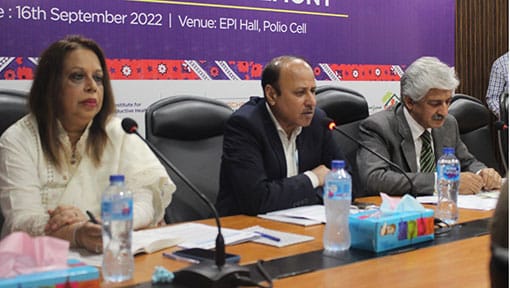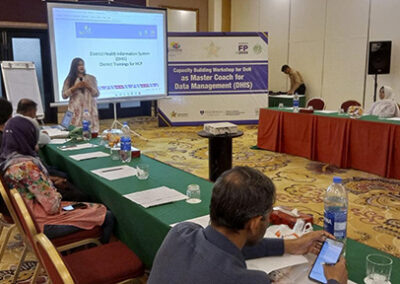
Dr. Talib Lashari (center) successfully advocated for committed family planning funds in Sindh Province.
The Challenge Initiative (TCI) has formed partnerships with both the Departments of Health and Population Welfare in Sindh Province to offer technical support for implementing high-impact practices and other interventions in the Karachi and Hyderabad divisions. Home to approximately 20 million residents. Karachi is Pakistan’s most populous city. Recent population growth has been driven by migration resulting from factors like floods and ongoing climate change. This surge in population reinforces the need for the government to take decisive action and develop strategies to address issues related to population, resource allocation, and the protection of fundamental human rights.
A costed implementation plan (CIP) is a multi-year actionable roadmap designed to help governments achieve their family planning goals. When the CIP was first introduced in 2015, there were no specific budget lines for family planning activities. This made it difficult to estimate allocations for family planning managed by the Departments of Health and Population Welfare. Consequently, the CIP department developed a formula based on estimates, involving contributions from various sources such as tertiary care hospitals, lady health workers, and other budgets. This formula remains valid to this day.
In 2018, the CIP department, under the leadership of the Minister of Health, expressed interest in implementing TCI in Sindh. However, making a TCI-required financial commitment to fund family planning efforts was a challenge due to the CIP formula. Dr. Talib Lashari – Focal Person for Family Planning and Technical Advisor for Sindh’s Costed Implementation Plan (CIP), who also leads TCI in the province – advocated with his team for the government to make adjustments to align with TCI’s financial requirements, emphasizing that it is a government-led initiative and districts must share their financial commitments.
District Management teams were initially hesitant to share their allocations and expenditures, but through TCI’s efforts and Dr. Lashari’s advocacy, trust was built around investing in TCI. A learning exchange took place to facilitate this shift, and the CIP department asked the Punjab government to share their budget formula. This was then shared with District Health Offices, leading to the official release of budget allocations and expenses that were endorsed by District Heads. Dr. Lashari emphasized that:
The accessibility of data for validation, research, and policymaking is very important and keeping it a state secret is unnecessary.”
Over time, advocacy efforts and technological advancements have led to the availability of relevant data, financial information, and annual budgets on the Finance Ministry’s website. The resistance to ring-fence family planning budgets in both the Departments of Health and Population Welfare stemmed from ownership issues and provider biases and required substantial effort to address. Besides advocacy meetings, the Government of Sindh utilized data and evidence from the CIP that was generated through 45 consultative meetings with public-private partners. Additionally, data was collected from Community Health Workers to formulate evidence-based recommendations for including family planning in federal and provincial budgets.
Dr. Lashari stressed the importance of engaging the private sector and non-governmental organizations, highlighting their role in generating evidence and bridging gaps between the community and government. He established an FP2030 group on Whatsapp to unite public and private sector partners and create a hub for policy-level recommendations. TCI has played a pivotal role through various channels, including TCI University, which received positive feedback among public sector staff.
Dr. Lashari’s efforts have fostered collaboration between the Departments of Health and Population Welfare to address uncontrolled population growth and advance family planning in Sindh province. At the same time, TCI’s engagement with the Department of Health has positively influenced behavior and relationships between departments, promoting a more coordinated approach to tackling population challenges.







